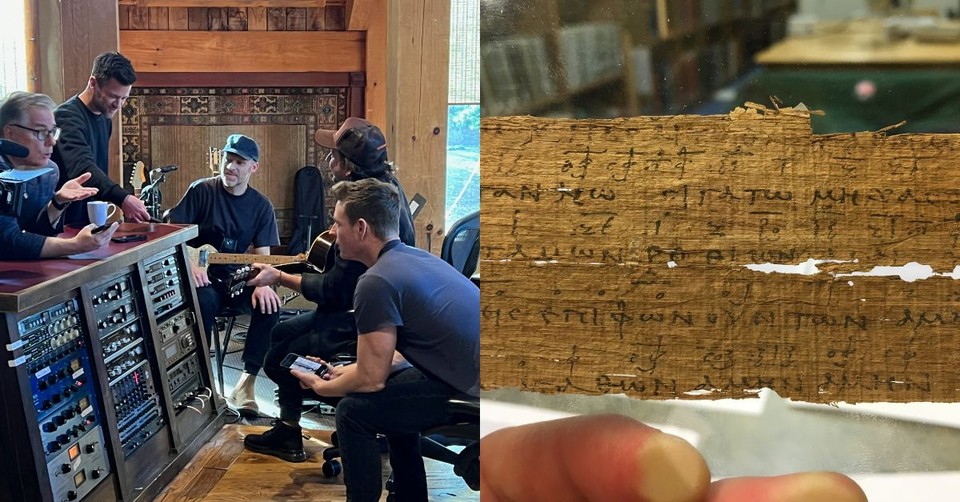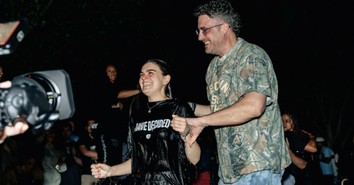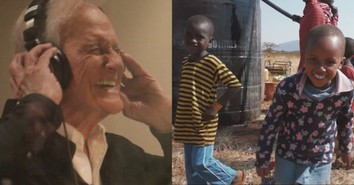The Oldest Christian Hymn Ever Found Is Being Sung Again after 1,800 Years

An 1,800-year-old hymn, believed to be the oldest Christian song preserved with both words and musical notes, has emerged from the ruins of Oxyrhynchus, Egypt -- and into modern worship. The 53-word song is the focus of a new documentary, The First Hymn, and also the heart of a new contemporary song by Chris Tomlin and Ben Fielding of the same name.
The song, known in the academic world as P.Oxy 1786, was discovered on parchment more than a century ago but only recently turned into a modern song.
Dated to the 200s, it is the oldest known Christian hymn complete with its lyrics and musical notations. Although the Bible is filled with songs, the melodies that accompany them have been lost to history.
Australian historian John Dickson is the documentary's host and travels to the Middle East to trace the hymn's ancient roots.
"To give back to the church a song that hasn't been sung for nearly 2000 years just seemed irresistible," Dickson said. "To stand in the footsteps of early Christians and witness the enduring power of their words is humbling."
The First Hymn, he said, "represents Christianity before there were denominations."
"It's a point of unity," he said.
The lyrics to the 53-word hymn read: "Let all be silent: The shining stars not sound forth, all rushing rivers be stilled, as we sing our hymn to the Father, Son, and Holy Spirit, as all powers cry out in answer, 'Amen, Amen.' Might, praise, and glory forever to our God, the only Giver of all good gifts. Amen. Amen."
The song's reference to the Trinity is significant, coming a full century before the Council of Nicaea (A.D. 325) affirmed that key biblical doctrine.
"It's amazing," Dickson says in the documentary. "This is the doctrine of the Trinity, the Christian idea that the one God is Father, Son and Holy Spirit. And you sometimes hear that that idea was only invented much later, say, in 325, at the Council of Nicaea, when Emperor Constantine forced this doctrine on the church.
"But the thing is -- here's the idea in a song from the previous century."
The documentary includes the ancient hymn's original melody as well as a new rendition performed by Tomlin. Originally, it had a pop sound.
"What's so fun about this is that the tune isn't the stodgy stuff we often associate with chanting monks," Dickson says. "It's pop music. It's the kind of melody you'd expect to hear at an ancient Greek pub or at some theater performance. Whoever composed this song was trying to take serious Christian ideas and give them to the masses."
Tomlin called the hymn "a precious gift from early believers," noting that many early Christians "literally gave their life for the gospel."
"And now, 2,000 years down the road, we can stand in that long line of faithful believers and sing with them," Tomlin said.
Photo Credit: ©Heritage
Michael Foust has covered the intersection of faith and news for 20 years. His stories have appeared in Baptist Press, Christianity Today, The Christian Post, the Leaf-Chronicle, the Toronto Star and the Knoxville News-Sentinel.
Listen to Michael's Podcast! He is the host of Crosswalk Talk, a podcast where he talks with Christian movie stars, musicians, directors, and more. Hear how famous Christian figures keep their faith a priority in Hollywood and discover the best Christian movies, books, television, and other entertainment. You can find Crosswalk Talk on LifeAudio.com, or subscribe on Apple or Spotify so you never miss an interview that will be sure to encourage your faith.
Originally published April 15, 2025.





